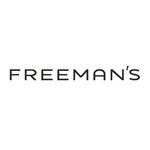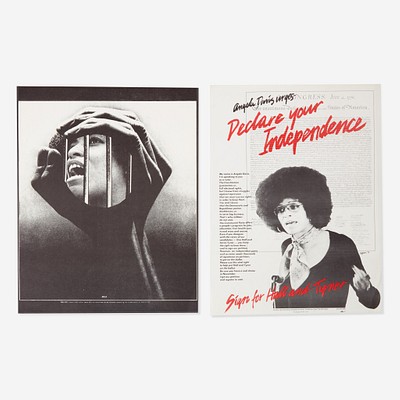[American Revolution] Jay, John Printed Document, signed
About Seller
2400 Market St
Philadelphia, PA 19147
United States
Established in 1805, Freeman’s Auction House holds tradition close, with a progressive mind-set towards marketing and promotion, along with access to a team of top experts in the auction business. And now with offices in New England, the Southeast, and on the West Coast, it has never been easier to ...Read more
Two ways to bid:
- Leave a max absentee bid and the platform will bid on your behalf up to your maximum bid during the live auction.
- Bid live during the auction and your bids will be submitted real-time to the auctioneer.
Bid Increments
| Price | Bid Increment |
|---|---|
| $0 | $25 |
| $500 | $50 |
| $1,000 | $100 |
| $2,000 | $200 |
| $3,000 | $250 |
| $5,000 | $500 |
| $10,000 | $1,000 |
| $20,000 | $2,000 |
| $30,000 | $2,500 |
| $50,000 | $5,000 |
| $100,000 | $10,000 |
About Auction
Sep 23, 2021
A collection of books and manuscripts. Curated by Darren WInston, Head of the Books and Manuscripts Department at Freeman's. Freeman's info@freemansauction.com
- Lot Description
The Continental Congress repays France's secret agent who funneled supplies and armaments to the Continental Army during the early years of the American Revolution
Philadelphia, June 15, 1779. One sheet, 5 1/4 x 10 1/8 in. (133 x 257 mm). Partially-printed document, signed by Founding Father John Jay, as President of the Continental Congress; addressed to "the Hon. Benjamin Franklin, Esq; Minister Plenipotentiary...", authorizing the payment of 29,000 livres tournois to French dramatist, diplomat, and spy, Pierre-Augustin Caron de Beaumarchais, for his clandestine efforts to supply Americans during the Revolution; counter-signed by Charles Thomson, as Secretary of Congress, and John Gibson, as Auditor General.
A rare document attesting to the clandestine efforts of the French government, and de Beaumarchais, in support of American Independence in the opening years of the American Revolution.
Before France officially joined the war in 1778, de Beaumarchais urged the French government to support the American cause. Hesitant to openly side with the fledgling Americans, lest risk war with Great Britain, Louis XVI agreed to funnel much needed support through unofficial channels. With the help of American merchant, Silas Deane of Connecticut, and French diplomat, Chevalier d'Éon, de Beaumarchais organized a phantom company based in Spain--Roderigue Hortalez and Company--as a conduit to funnel arms, money, and supplies. The French government would provide loans to the company, which would then purchase arms and supplies, and then re-sell them to the Americans. By 1778 de Beaumarchais and Hortalez and Co. had accumalated a significant amount of debt, and due to the French government's inability to recognize the payments for neutrality's sake, they were on the verge of financial collapse. It was not until June of 1779 that Congress--through the intervention of de Beaumarchais's agent--authorized the Treasury to prepare bills of exhange in order to repay de Beaumarchais. This document, given to de Beaumarchais, was only one of many bills of exchange given to him to repay his debt.
Very Rare. We can locate only three other similar documents, each for different amounts, as having ever been on the market. A fine example.
Stack's Bowers Galleries, New York, 2012, Lot 7321
- Shipping Info
-
No lot may be removed from Freeman’s premises until the buyer has paid in full the purchase price therefor including Buyer’s Premium or has satisfied such terms that Freeman’s, in its sole discretion, shall require. Subject to the foregoing, all Property shall be paid for and removed by the buyer at his/ her expense within ten (10) days of sale and, if not so removed, may be sold by Freeman’s, or sent by Freeman’s to a third-party storage facility, at the sole risk and charge of the buyer(s), and Freeman’s may prohibit the buyer from participating, directly or indirectly, as a bidder or buyer in any future sale or sales. In addition to other remedies available to Freeman’s by law, Freeman’s reserves the right to impose a late charge of 1.5% per month of the total purchase price on any balance remaining ten (10) days after the day of sale. If Property is not removed by the buyer within ten (10) days, a handling charge of 2% of the total purchase price per month from the tenth day after the sale until removal by the buyer shall be payable to Freeman’s by the buyer. Freeman’s will not be responsible for any loss, damage, theft, or otherwise responsible for any goods left in Freeman’s possession after ten (10) days. If the foregoing conditions or any applicable provisions of law are not complied with, in addition to other remedies available to Freeman’s and the Consignor (including without limitation the right to hold the buyer(s) liable for the bid price) Freeman’s, at its option, may either cancel the sale, retaining as liquidated damages all payments made by the buyer(s), or resell the property. In such event, the buyer(s) shall remain liable for any deficiency in the original purchase price and will also be responsible for all costs, including warehousing, the expense of the ultimate sale, and Freeman’s commission at its regular rates together with all related and incidental charges, including legal fees. Payment is a precondition to removal. Payment shall be by cash, certified check or similar bank draft, or any other method approved by Freeman’s. Checks will not be deemed to constitute payment until cleared. Any exceptions must be made upon Freeman’s written approval of credit prior to sale. In addition, a defaulting buyer will be deemed to have granted and assigned to Freeman’s, a continuing security interest of first priority in any property or money of, or owing to such buyer in Freeman’ possession, and Freeman’s may retain and apply such property or money as collateral security for the obligations due to Freeman’s. Freeman’s shall have all of the rights accorded a secured party under the Pennsylvania Uniform Commercial Code.
-
- Buyer's Premium



 EUR
EUR CAD
CAD AUD
AUD GBP
GBP MXN
MXN HKD
HKD CNY
CNY MYR
MYR SEK
SEK SGD
SGD CHF
CHF THB
THB![[American Revolution] Jay, John Printed Document, signed](https://s1.img.bidsquare.com/item/l/9242/9242253.jpeg?t=1MmbG2)
![[American Revolution] Jay, John Printed Document, signed](https://s1.img.bidsquare.com/item/s/9242/9242253.jpeg?t=1MmbG2)










